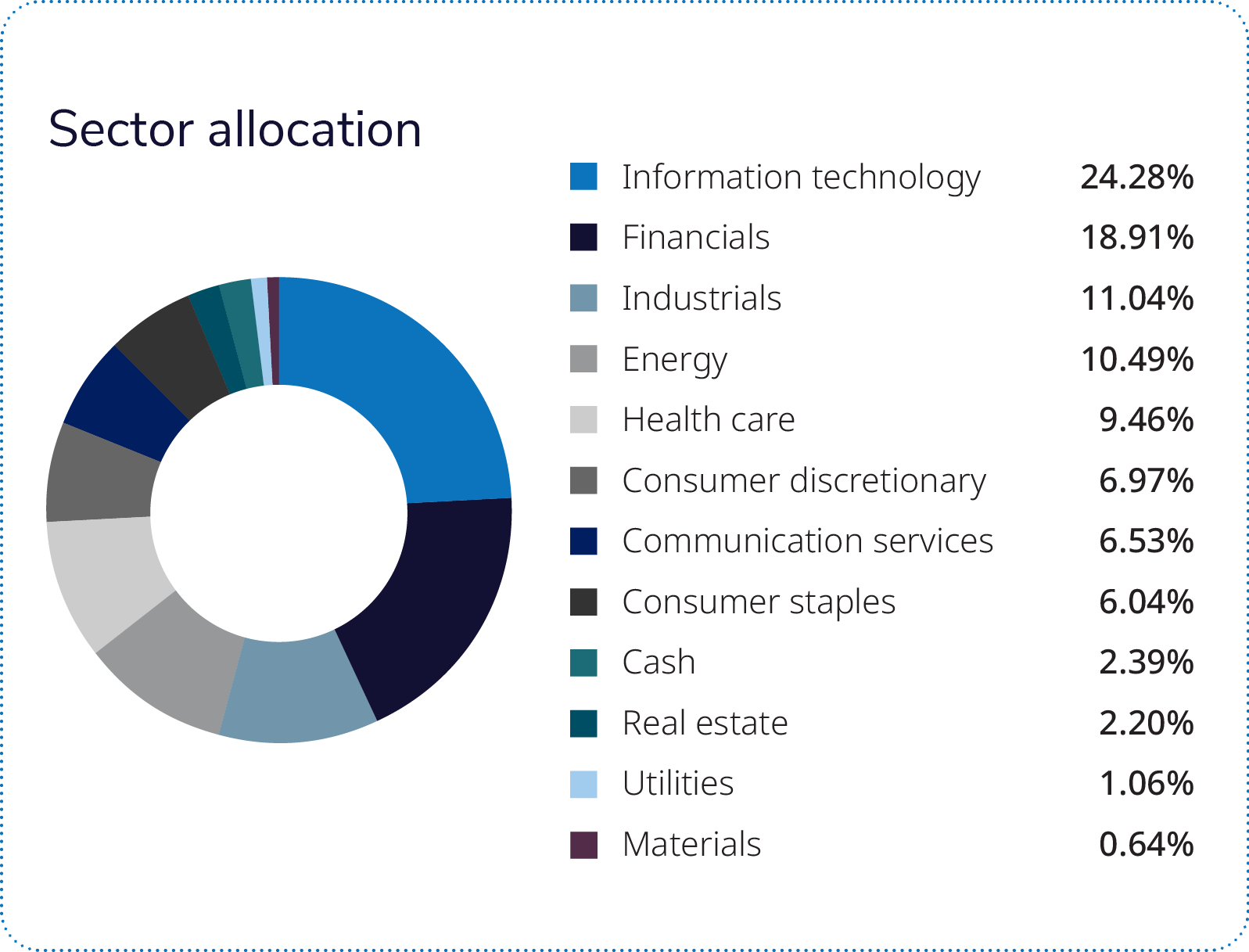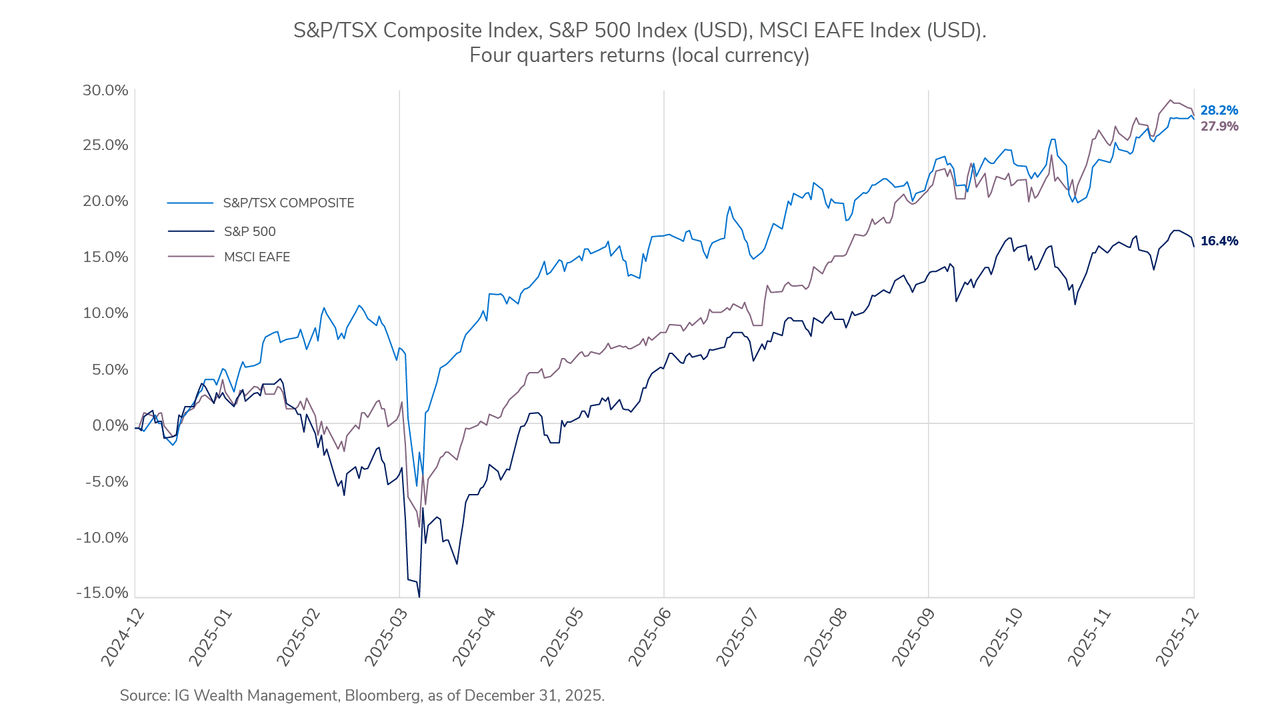Guardian Capital Global Dividend
Mandate commentary
Q4 2025
Highlights
① The mandate trailed the MSCI World Index, as its high-quality bias lagged a high-beta, momentum-driven market this quarter.
② Global growth strengthened as inflation eased, and policy turned supportive.
③ Equities and quality fixed income remain positioned for growth.
Mandate overview
 The mandate’s underperformance this quarter was due to overall negative sector allocation and stock selection effects. The financials sector was the strategy’s largest contributor to relative performance, with strong stock selection from Royal Bank of Canada and Allianz. Alphabet added to relative performance in the communication services sector. The health care sector added to relative returns on strong stock selection from AstraZeneca, with a modest offset from the portfolio’s position in AbbVie. The utilities sector was a slight drag, due to the WEC Energy Group holding. Similarly, the materials sector detracted from relative performance from the position in Air Products and Chemicals. The consumer discretionary sector detracted from relative returns on negative stock selection from Home Depot, with a positive offset from the portfolio’s underweight allocation. Energy detracted from relative returns from weak stock selection from Williams Companies, with a positive offset from the position in TotalEnergies. The consumer staples sector was a drag on relative performance, due to negative stock selection in Costco. The positions in the information technology sector in Motorola Solutions, Oracle and Microsoft were a drag on relative returns, although somewhat offset by positive selection from ASML. Industrials were the largest detractor from relative performance, primarily from Wolters Kluwer and Republic Services, with a positive offset from Parker-Hannifin.
The mandate’s underperformance this quarter was due to overall negative sector allocation and stock selection effects. The financials sector was the strategy’s largest contributor to relative performance, with strong stock selection from Royal Bank of Canada and Allianz. Alphabet added to relative performance in the communication services sector. The health care sector added to relative returns on strong stock selection from AstraZeneca, with a modest offset from the portfolio’s position in AbbVie. The utilities sector was a slight drag, due to the WEC Energy Group holding. Similarly, the materials sector detracted from relative performance from the position in Air Products and Chemicals. The consumer discretionary sector detracted from relative returns on negative stock selection from Home Depot, with a positive offset from the portfolio’s underweight allocation. Energy detracted from relative returns from weak stock selection from Williams Companies, with a positive offset from the position in TotalEnergies. The consumer staples sector was a drag on relative performance, due to negative stock selection in Costco. The positions in the information technology sector in Motorola Solutions, Oracle and Microsoft were a drag on relative returns, although somewhat offset by positive selection from ASML. Industrials were the largest detractor from relative performance, primarily from Wolters Kluwer and Republic Services, with a positive offset from Parker-Hannifin.
Mandate: Guardian Capital Global Dividend portfolio stock review
Performance contributors
Alphabet contributed positively to relative performance, as investors responded enthusiastically to mounting evidence that its AI strategy is driving tangible competitive and financial gains, highlighted by the release of the Gemini 3 model and continued progress in custom TPU chips. Strong earnings, improving clarity around a previously overhanging U.S. antitrust case and accelerating growth across Internet search, YouTube and cloud, supported by rising demand for AI infrastructure, helped dispel concerns about competitive erosion from generative AI peers. Alphabet is now positioned as one of the most durable and profitable platforms in mega-cap technology. We added to the position during the quarter.
Royal Bank of Canada added to relative performance, bolstered by record earnings that surpassed expectations. The strong results were driven by performance across all business segments, particularly robust growth in wealth management and capital markets, where net income materially increased. The bank's diversified business model, strong capital position and strategic investments in AI technology contributed to investor confidence. The bank also increased its quarterly dividend by 6.5% and set a new return-on-equity target of over 17%, highlighting management's positive outlook.
Performance detractors
Wolters Kluwer detracted from relative performance, as the shares de-rated following a strong multi-year run, with investors increasingly focused on valuation and near-term growth visibility despite solid earnings execution, reiterated guidance and an accelerated buyback. Market sentiment was further pressured by concerns over emerging competition — particularly in health care, from newer AI-enabled entrants — which heightened skepticism around paying a premium multiple for mid-single-digit organic growth. Against this backdrop, and with rising concerns that AI could incrementally disrupt elements of its core information services model, we reduced our position during the quarter.
Motorola Solutions underperformed during the quarter, on investor concerns that appear to outweigh its otherwise solid fundamentals. Fears of contract award delays due to the U.S. government shutdown, anticipated tariff headwinds and near-term dilution from a recent acquisition pressured the stock, despite strong demand from public safety customers. While we trimmed the position during the quarter, we remain constructive on Motorola’s long-term outlook, given its consistent execution, robust profitability and commitment to shareholder returns. Its strategic investments in AI-driven video surveillance and emergency communication technology further strengthen its leadership in mission-critical security solutions.
Total gross returns:
Total return | QTD | YTD | 1YR | 3YR | 5YR | SINCE INC. (FEB. 18, 2025) |
GUARDIAN CAPITAL GLOBAL DIVIDEND | 1.45%
| 8.27% |
Mandate repositioning
The portfolio managers believe that in this current macroeconomic environment, profitability, stability and safety need to be embraced, so they focus the portfolio on companies with positive earnings growth, coupled with strong dividend growth.
During the quarter, the manager initiated a position in Oracle on strong earnings and dividend growth predictions. Oracle’s aggressive expansion in cloud and AI infrastructure, coupled with a historic backlog of contracts, has positioned the company at the forefront of this space. It is leveraging massive contracts with OpenAI and Meta. Its financial results demonstrate double-digit revenue growth, strong free cash flow and high return on equity. To fund the purchase of Oracle, the manager trimmed the portfolio’s position in Air Products.
The manager exited EOG Resources on rising probabilities of a dividend cut, and slower earnings and dividend growth predictions. With the proceeds from the sale, the manager increased the portfolio’s position in Alphabet and TotalEnergies.
The mandate is overweight in the energy and financials sectors, and underweight in the communication services, consumer discretionary, materials and information technology sectors. Regionally, the strategy has approximately 25% weight in Europe, 74% weight in North America and 1% weight in Asia.
Market overview: global growth strengthened, inflation eased, policy supportive
Markets ended the fourth quarter of 2025 on a strong note, capping a year defined by resilience and broad-based gains. Equities led performance, as investors looked beyond policy noise and focused on improving fundamentals. Global markets advanced, supported by steady corporate earnings, easing inflation pressures and a clear shift toward lower interest rates. Canada outperformed most developed peers, driven by strength in materials and financials, while European and Asian markets rebounded on firmer trade activity and renewed investor confidence. In the U.S., equity performance remained positive, led by technology and communication services, with improving breadth across sectors signalling a healthier market foundation.
Fixed income delivered modest but positive returns, as central banks continued to ease policy. Government yields declined on the short end while longer maturities remained stable, allowing coupon income to drive returns. Credit conditions stayed firm, underscoring the strength of corporate balance sheets entering 2026.

Market outlook: equities and quality fixed income positioned for growth
Entering 2026, global markets are positioned on a solid footing. Easing monetary policy and supportive fiscal conditions are expected to sustain growth across major economies. In the U.S., healthy earnings and productivity gains continue to anchor performance. Canada benefits from resource strength and steady financials, while Europe and Asia offer improving valuation opportunities through accelerating trade and industrial expansion. Fixed income markets provide renewed income potential as yields stabilize, and credit quality remains robust.
Overall, conditions favour a balanced, diversified approach.
To discuss your investment strategy, speak to your IG Advisor.
Azure Managed Investments™ provides discretionary investment management services distributed by IG Wealth Management Inc., Investment dealer. We will manage your Azure Managed Investments Accounts on a segregated basis in accordance with your investment policy statement and the resulting mandate selected by you. Mandates will be managed by I.G. Investment Management, Ltd. and partner organizations. You are required to make a minimum initial investment of $150,000; please read the Azure Managed Investment Account Agreement for complete details, including fees and expenses.
This commentary may contain forward-looking information, which reflects our or third-party current expectations or forecasts of future events. Forward-looking information is inherently subject to, among other things, risks, uncertainties and assumptions that could cause actual results to differ materially from those expressed herein. These risks, uncertainties and assumptions include, without limitation, general economic, political and market factors, interest and foreign exchange rates, the volatility of equity and capital markets, business competition, technological change, changes in government regulations, changes in tax laws, unexpected judicial or regulatory proceedings and catastrophic events. Please consider these and other factors carefully and do not place undue reliance on forward-looking information. The forward-looking information contained herein is current only as of December 31, 2025. There should be no expectation that such information will in all circumstances be updated, supplemented or revised, whether as a result of new information, changing circumstances, future events or otherwise.
This commentary is published by IG Wealth Management. It is provided as a general source of information. It is not intended to provide investment advice or as an endorsement of any investment. Some of the securities mentioned may be owned by IG Wealth Management or its mutual funds, or by portfolios managed by our external advisors. It may contain certain forward-looking statements regarding the market conditions which are based upon assumptions believed to be reasonable at the time of publishing. Every effort has been made to ensure that the material contained in the commentary is accurate at the time of publication, however, IG Wealth Management cannot guarantee the accuracy or the completeness of such material and accepts no responsibility for any loss arising from any use of or reliance on the information contained herein.
Past performance may not be repeated and is not indicative of future results. Actual performance may vary due to a range of factors including but not limited to current market conditions, timing of contributions and withdrawals, client-imposed restrictions, fees, expenses, tax considerations and other individual circumstances. There are no assurances that any mandate will achieve its objectives and/or avoid any losses.
Trademarks, including IG Wealth Management and IG Private Wealth Management, are owned by IGM Financial Inc. and licensed to subsidiary corporations.
©2026 IGWM Inc.